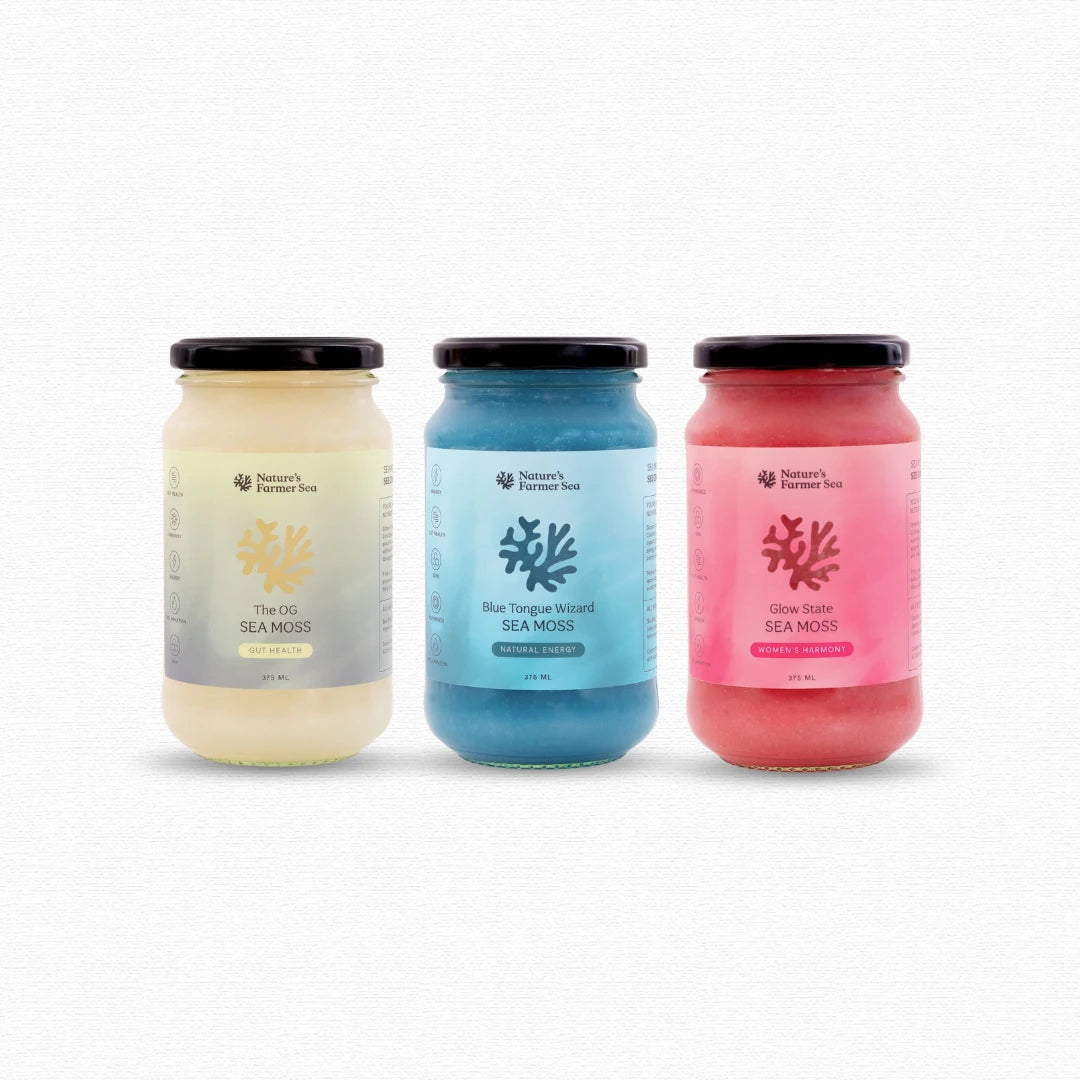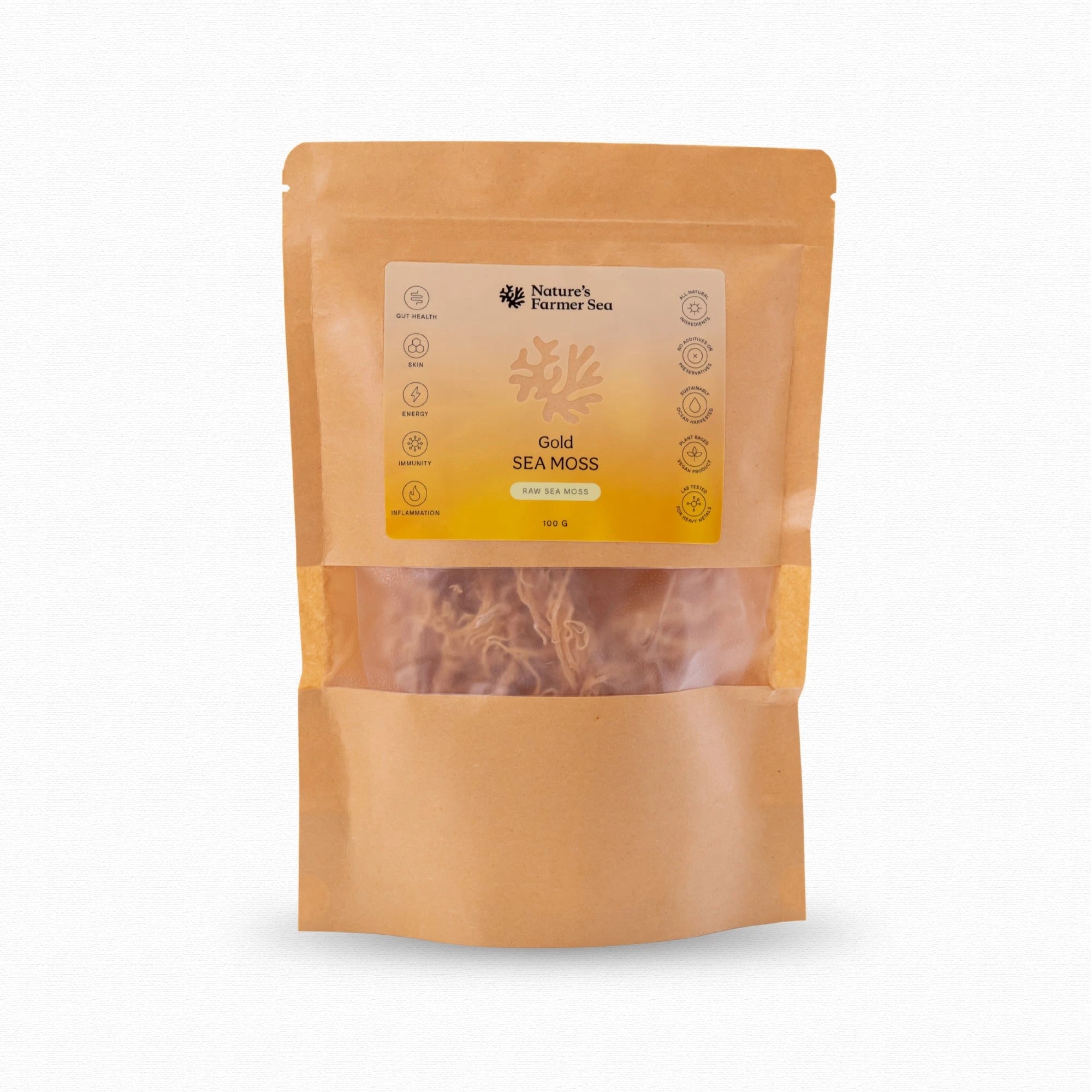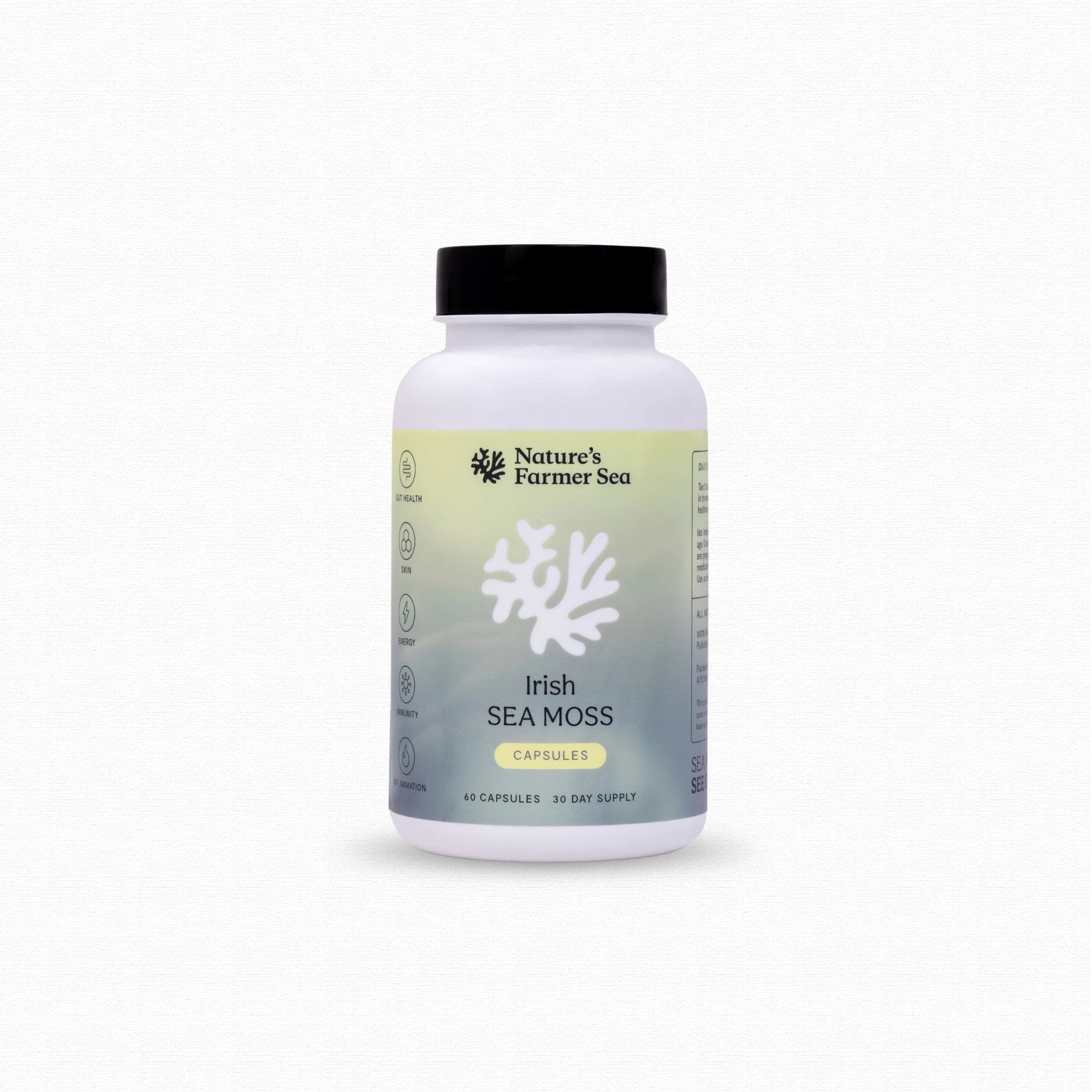Unlocking Clear Skin: The Diet, Hormone, and Gut Health Connection to Acne (and How Sea Moss Can Help)
Acne, a widespread skin concern, affects millions globally, often peaking during adolescence. However, for many, this isn't just a teenage phase, persisting into adulthood and impacting emotional well-being and self-confidence. Understanding the intricate interplay of diet, hormones, and gut health is crucial in managing and potentially preventing acne breakouts. In this blog post, we'll delve into these interconnected factors and explore the potential benefits of incorporating Sea Moss into your diet for clearer skin.
The Link Between Diet and Acne
Mounting evidence underscores the significant role our dietary choices play in acne development. The typical Western diet, often characterized by high levels of refined carbohydrates, sugars, and dairy products, has been strongly linked to an increased risk of acne.
The Impact of Dairy on Acne
Dairy consumption can be a significant contributor to acne for several reasons. Milk contains hormones that elevate insulin-like growth factor 1 (IGF-1), which stimulates the sebaceous glands, leading to increased oil production and, consequently, more acne. The protein composition of milk, primarily casein and whey, further exacerbates this effect, with casein being particularly effective at raising IGF-1 levels. Whey proteins also promote insulin secretion, further contributing to an environment conducive to breakouts.
Furthermore, milk from pregnant cows contains hormone precursors that can be converted into dihydrotestosterone (DHT), a potent form of testosterone. DHT increases sebum production, a key factor in acne development. If you're considering eliminating dairy to manage acne, it's vital to find alternative sources for essential nutrients like calcium, vitamin D, and protein. Excellent plant-based options include leafy greens, fortified plant-based milks, nuts, seeds, egg yolks, and legumes.
The Role of High Glycemic Index (GI) Foods
High GI foods, which cause rapid spikes in blood sugar levels, can also contribute to acne. When we consume foods like white bread, sugary snacks, and sweetened beverages, our body releases more insulin. Elevated insulin levels can increase sebum (oil) production in the skin, leading to clogged pores and acne formation.
Research has indicated that adolescents who follow a high-GI diet experience a higher incidence of acne compared to those with a low-GI diet, highlighting the crucial link between food choices and hormone levels in maintaining skin health.
Hormonal Influence on Acne
Hormones are central to acne development, and their interaction with our diet is complex and significant.
The Role of Androgens
Androgens, such as testosterone and its active form, DHT, play vital roles in the body, including stimulating the sebaceous glands in our skin to produce oil (sebum). An imbalance in these hormones, often influenced by diet, can lead to excessive oil production, clogged pores, and inflammation – all significant contributors to acne.
Insulin resistance, commonly associated with diets high in sugar and refined carbohydrates, can elevate levels of androgens and insulin-like growth factor 1 (IGF-1). This creates a cycle where elevated insulin levels further worsen acne by promoting excess oil production. Conditions like polycystic ovary syndrome (PCOS), which often involve hormonal imbalances and insulin resistance, can significantly increase the risk of acne.
The mTORC1 Pathway
The mTORC1 pathway serves as a critical link between our dietary choices and acne development. Consuming foods that cause rapid insulin spikes, such as sugary snacks and refined carbohydrates, activates this pathway. Insulin and certain amino acids, particularly leucine and glutamine found in dairy, can trigger mTORC1, leading to increased oil production and inflammation in the skin, both of which contribute to acne.
Saturated fats, also found in dairy and fatty meats, can further activate the mTORC1 pathway, potentially worsening acne. Conversely, omega-3 fatty acids, such as eicosapentaenoic acid (EPA) from fish, may help inhibit this pathway, offering a protective effect against breakouts. High insulin and IGF-1 levels resulting from our diet can also amplify mTORC1 activity, promoting processes that lead to excess oil production. Additionally, these dietary components can lower levels of FoxO1, a protein crucial for maintaining healthy skin.
Active mTORC1 influences how our skin produces fatty acids, and an excess can alter the oil's composition, potentially exacerbating acne. Adopting a diet that minimizes IGF-1 and insulin spikes can help regulate mTORC1 activity, leading to better control of oil production and inflammation, and potentially fewer breakouts.
Incorporating plant-based foods and spices known for their natural mTORC1-inhibiting properties can also support clearer skin. For example, compounds found in green tea, like epigallocatechin-3-gallate (EGCG), and resveratrol from grapes have shown promise in reducing mTORC1 and enhancing Fox01, making them beneficial additions to an acne-friendly diet.
The Gut-Skin Connection
Emerging research highlights the fascinating connection between our gut health and skin conditions like acne. The gut microbiome, a diverse community of bacteria residing in our digestive system, plays a vital role in supporting our immune system and overall well-being.
Gut Dysbiosis and Inflammation
An imbalance in the gut microbiome, often due to poor diet, stress, or antibiotic use, can lead to dysbiosis, a state that may worsen inflammatory skin issues. An unhealthy gut can increase intestinal permeability, allowing pro-inflammatory substances to enter the bloodstream, potentially disrupting skin balance and contributing to conditions like acne.
A healthy gut microbiome can help reduce inflammation, potentially alleviating acne symptoms. Consuming probiotics, found in fermented foods like yogurt and sauerkraut, can promote a balanced gut environment. These beneficial bacteria play a role in regulating inflammation and supporting the skin’s barrier function.
The Power of Dietary Fibre
Fibre-rich foods are essential for maintaining a healthy gut microbiome. They nourish beneficial gut bacteria, which produce short-chain fatty acids (SCFAs) known for their anti-inflammatory properties. SCFAs, particularly butyrate, can enhance gut barrier function and improve skin health. Nature's Farmer Sea Irish Sea Moss is a source of soluble and prebiotic fibre, which can help nourish these beneficial gut bacteria, contributing to a healthier gut and potentially clearer skin. You can learn more about the gut-skin axis and its impact on overall health in our blog post on
Incorporating foods high in fibre, such as whole grains, fruits, and vegetables, not only nourishes your gut but also helps promote clear skin. Research suggests that diets rich in fibre can lead to greater bacterial diversity in the gut, which is essential for optimal health.
Nutritional Support for Healthy Skin
Certain nutrients have a direct impact on skin health. Here are some key players:
-
Zinc: This mineral has been shown to reduce infection, inflammation, and improve acne symptoms. It supports immune function and helps regulate oil production in the skin. Nature's Farmer Sea Irish Sea Moss is a natural source of Zinc, making it a valuable addition to a skin-friendly diet.
-
Spirulina: This nutrient-dense blue-green algae is rich in vitamins, minerals, and antioxidants. It supports the growth of important skin cells and aids in collagen production. Its antioxidant and anti-inflammatory properties can reduce signs of aging, protect against UV damage, and support wound healing. It's particularly beneficial for oily or acne-prone skin, as well as dryness.
-
Omega-3 Fatty Acids: These healthy fats, found in foods like fatty fish, flaxseeds, and walnuts, are known to help lower inflammation throughout the body, including the skin. Research suggests that increasing omega-3 intake can lead to a reduction in acne severity.
-
Antioxidants: Fruits and vegetables rich in vitamins A, C, and E are powerful in combating oxidative stress in the skin. Antioxidants neutralize free radicals, which can damage skin cells and worsen inflammation. Nature's Farmer Sea Irish Sea Moss, abundant in these vital vitamins, is an excellent dietary addition for vibrant, healthy skin.
-
Curcumin: Found in turmeric, curcumin possesses potent anti-inflammatory properties that may help reduce acne-related inflammation. Studies suggest it can mitigate the negative effects of poor dietary choices on skin health. Nature's Farmer Sea 'Ginger Ninja' combines ginger and turmeric, potentially enhancing these anti-inflammatory benefits.
-
Sulphur: This ingredient has a long history in skincare due to its antibacterial, antifungal, antiviral, and keratolytic properties, making it particularly beneficial for managing acne, especially with topical applications.
Incorporating these nutrients into your diet can improve your skin and enhance your overall health. Limiting dairy, high GI foods, and saturated fats while focusing on whole, nutrient-dense foods creates a supportive environment for clearer skin.
Lifestyle Factors and Their Impact on Acne
Beyond diet, other lifestyle factors significantly influence acne. Stress, lack of sleep, and inadequate hydration can all contribute to skin issues. Stress, in particular, can trigger hormonal fluctuations that may worsen acne. You can explore stress management techniques further in our blog post on
Final Thoughts: Nourishing Your Skin from Within
Acne is a multifaceted condition influenced by the intricate interplay of diet, hormones, and gut health. By making informed dietary choices, supporting a healthy gut microbiome with fibre-rich foods like Nature's Farmer Sea Irish Sea Moss, and incorporating nutrient-rich foods, you can take proactive steps toward managing acne and achieving clearer skin.
Remember, your dietary choices have a profound impact not only on your skin but on your overall well-being. Embrace a balanced diet rich in whole foods, healthy fats, and plenty of fruits and vegetables. Pay attention to how different foods affect your skin, and consider incorporating nutrient-rich Nature's Farmer Sea products to bolster your intake of essential vitamins and minerals. Small, consistent changes can lead to significant improvements in your skin health journey.
Ready to nourish your skin from within? Explore the range of
Citations:
Dall’Oglio, F., Nasca, M. R., Fiorentini, F., & Micali, G. (2021). Diet and acne: review of the evidence from 2009 to 2020. International Journal of Dermatology, 60(6).




